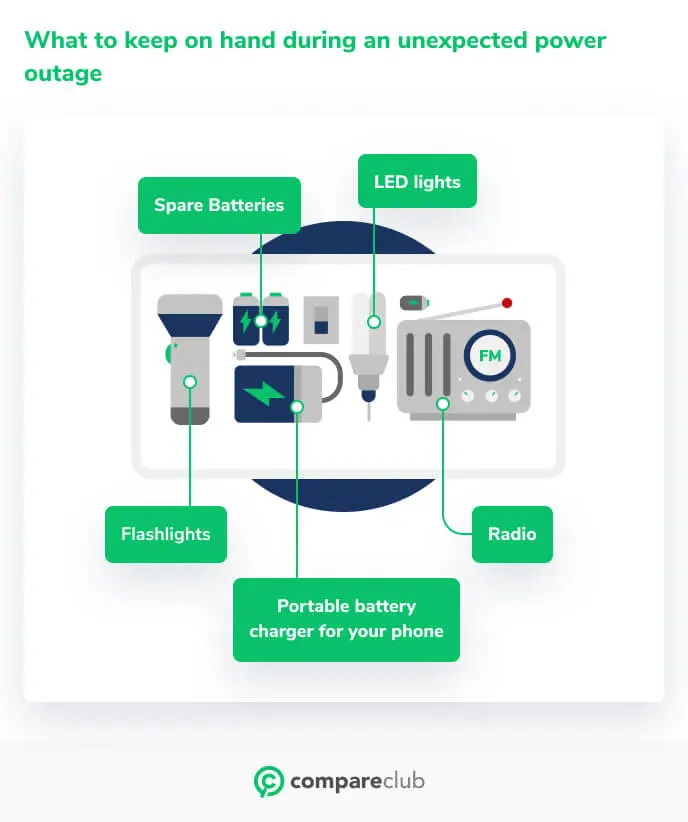What should I do when the power goes out?
Key Points
If you experience a blackout, first establish whether or not the power cut is happening only in your house or if it is widespread.
Power outages can occur for a range of reasons, such as storms, bushfires, flooding, faulty appliances, blown fuses, or an excess of demand.
Unplug all appliances during a power outage, to prevent damage caused by potential power surges when the electricity is switched back on.
We've all been there - you're sitting on the lounge, watching TV, when all of a sudden the room goes dark.
It's a power outage, and it can seriously throw life out of whack.
There are several reasons why the power might go out (we'll get into those later in this guide), but first let's address the immediate question of what to do when your power goes out.
COMPARE & SAVEFind a light source
First, find a source of light.
If your power goes out during the day, this might not be relevant.
But if it goes out at night, you'll need sufficient light to see.
This might be an emergency flashlight or even the flashlight on a mobile phone.
Be sure you know where these things are kept so that they're easy to find in an unexpected power outage.
Then you can account for everyone in the house and ensure that they're safe.

Is the power out in my area?
Once you've located a temporary light and done a head count of everyone inside, it's time to determine what you're dealing with.
It's a good idea to establish how extensive the power outage is - are we talking about the entire suburb or is it just in your house?
Take a quick look outside for clues: are the streetlights on? Do your neighbours appear to have power?
If so, then it's possible that the power is only out at your property.
If that's the case, check out our next section 'Why is the power out?'
If the power outage seems to apply to a larger area, you may be able to verify your suspicions online.
Depending on where you live and who your distributor is, you might have access to a power outage checker.
Here are some online resources that publish information on current power outages:
Keep in mind that in the event of a power outage, you may not have access to the internet or phone services.
Who should you call when the power goes out?
While a power outage alone isn't necessarily an emergency, it could be a sign of one. If you smell gas, or if someone's life is in danger, call 000 immediately.
If you do have phone services, there are some people you can call when the power goes out.
You may want to call members of your household who are not home to let them know.
You may also want to report your outage to your electricity company.
To do this, you'll need to telephone your local distributor, who isn't necessarily your retailer.
Distributors supply power to a property, while retailers sell it to the customer.
When the power goes out and you are unable to remedy the situation yourself, the distributor is usually the one who turns it back on.
Distributors vary by location, so where you live determines who your distributor is.
It's a good idea to make note of which company distributes your power supply, along with their contact details in case of an emergency.
Not sure who your distributor is? You can find this information on your electricity bill.
Your retailer may also be able to tell you the answer.
However, during a widespread power outage, phone lines may be very busy.
Electricity Distributors in Australia
ACT & NSW
Distributor | Fault | Emergencies | General Inquiries |
|---|---|---|
Endeavor Energy | 131 003 | 133 718 |
Essential Energy | 132 080 | 132 391 |
Ausgrid | 131 388 | 131 535 |
Evoenergy | 131 093 | 132 386 |
Queensland
Distributor | Fault | Emergencies | General Inquiries |
|---|---|---|
Energex | 136 262 | 131 962 | 131 253 |
Ergon | 132 296 | 131 046 - Retail residential 1300 135 210 - Retail business |
South Australia
Distributor | Fault | Emergencies | General Inquiries |
|---|---|---|
SA Power Networks | 131 366 | 131 261 |
Tasmania
Distributor | Fault | Emergencies | General Inquiries |
|---|---|---|
TasNetworks | 132 004 | 1300 132 003 - residential customers 1300 132 045 - small to medium business |
Victoria
Distributor | Fault | Emergencies | General Inquiries |
|---|---|---|
Citipower | 131 280 | 1300 301 101 |
Jemena | 1300 131 871 | 131 626 |
Powercor Australia | 132 412 | 132 206 |
AusNet Services | 131 799 | 1300 360 795 |
United Energy Distribution | 132 099 | 1300 131 689 |
Northern Territory
Distributor | Fault | Emergencies | General Inquiries |
|---|---|---|
Power and Water Corporation | 1800 245 090 | 1800 245 092 |
Western Australia
Distributor | Fault | Emergencies | General Inquiries |
|---|---|---|
Western Power | 131 351 | 131 087 |
Why is the power out?
Let's take a closer look now at why the power can go out, along with which situations are an easy fix and which aren't.
What are the causes of power outages?
Widespread power outages are often due to weather.
A storm with high winds can knock down power lines, leading to widespread blackouts.
Bushfires, floods, and cyclones can also lead to power outages; in these situations safety is paramount.
Supply and demand also play a role in power outages.
You may be familiar with the frequent blackouts in South Australia, which are often related to usage spikes.
When too many people are using their power at the same time, demand doesn't always keep up, which causes an outage.
For example, large numbers of people might rely on their heat in the winter, which can mean blackouts during cold nights.
These types of weather-related power outages are usually not an easy fix, at least not by members of the household.
So who can you rely on when the power goes out because of a storm?
The distributor will need to resolve the problem and turn the power back on at the source.
However, there are some situations where the power outage is contained to your home.
This is often because of a blown fuse.
Fuses can blow because of faulty wiring, a broken light bulb, or a faulty appliance, which overloads your electrical system and results in a blown fuse or power shortage.
When this happens, your power may go out in one area of the house or across the whole house.
Here's what you should check for.
Checking your power box
So you've checked with the neighbours and it looks like you're the only one on the block who is experiencing a blackout.
The next step is to check your power box.
The power box is usually located on the exterior wall of the building.
Open the box and check the trip switches to see if any are in the off position.
If so, you can usually flip the switch back to the 'on' position and restore power.
If the outage is due to a blown fuse, you can switch off the mains power and replace the fuse.
If you're still unable to resolve the issue, or if you're unfamiliar with how to replace a fuse, you may need to contact an electrician to rectify the problem.
Waiting for the power to come back on
After you've identified the cause of a power outage, you may have some time to kill before it comes back on. This can present some challenges, especially if you have multiple people in the household!
Before you worry about entertaining the family, there are some safety precautions to take and logistics to tackle.
What should you unplug?
You should switch off and unplug everything during the power cut. That includes your fridge, television, toaster, washing machine, stove, modem, and computer.
When the power comes back on, there can be surges that could damage your appliances.
There's one exception to this---you may want to keep a light plugged in so you know when the power comes back on!
How do you keep your food cold?
Whatever you do, don't open the fridge! Keep the fridge and freezer doors shut to keep everything inside cool for as long as possible.
If you've got an esky and some ice, you could consider salvaging some of the contents, but otherwise keep it closed.
Once the power has been off for four hours, food safety is at risk.
This time is cut in half for meat, poultry, seafood, and other perishable food, which need to be moved to cold storage after two hours.
If the temperature of your refrigerator goes above 5 degrees for over two hours, these perishables should be thrown away.
If your freezer is full, it will stay cold for up to 48 hours.
If it's half-full, expect it to stay cold for about 24 hours.
How do you pass the time?
Without power, you might find yourself at a loss of what to do after you've unplugged everything!
Keep your family close by while you wait, to avoid any bumps and bruises in the dark, especially with little ones.
It helps to stay calm while you wait, so entertaining distractions can help.
If it's light outside, and the weather is reasonable, go for a walk.
Use it as an excuse to get outside and get moving.
If you're confined to the indoors, here are a few things to try (assuming you have headlamps or another reliable light source):
Card games
Make a tent in the lounge room out of pillows and blankets
Play a board game
Tell stories
Play charades
Sing
Make shadow puppets
Before you know it, the power will be back on!
Power is an important part of any household, because much of our daily lives depends on it.
Unfortunately, it can also be a big part of our bills! Don't forget to shop around for a better deal on power.
Our service is free to use and takes the legwork out of having to compare plans yourself.
Give it a go and save today. Click here to compare energy prices.
COMPARE & SAVEThis guide is opinion only and should not be taken as financial advice. Check with a financial professional before making any decisions.



